Macquarie University ENVS825: Sustainable Development Essay Analysis
VerifiedAdded on 2023/02/01
|9
|2201
|54
Essay
AI Summary
This essay provides a comprehensive exploration of sustainable development, examining various discourses and their impact on organizational practices. It begins by defining sustainable development and then delves into several key discourses, including ecofeminism, deep ecology, social ecology, ecological modernization, traditional knowledge, rights-based approaches, anthropomorphism, and ecocentrism. The essay analyzes how these discourses influence an organization's approach to sustainability, highlighting the strengths and weaknesses of each perspective. The author critiques the different discourses, emphasizing the importance of traditional knowledge in achieving sustainable development. The essay concludes by identifying traditional knowledge and social ecology as the two most influential discourses, arguing that they provide valuable frameworks for balancing human needs with environmental preservation, ultimately leading to long-term growth and expansion within an organization. The essay uses references from various academic journals.
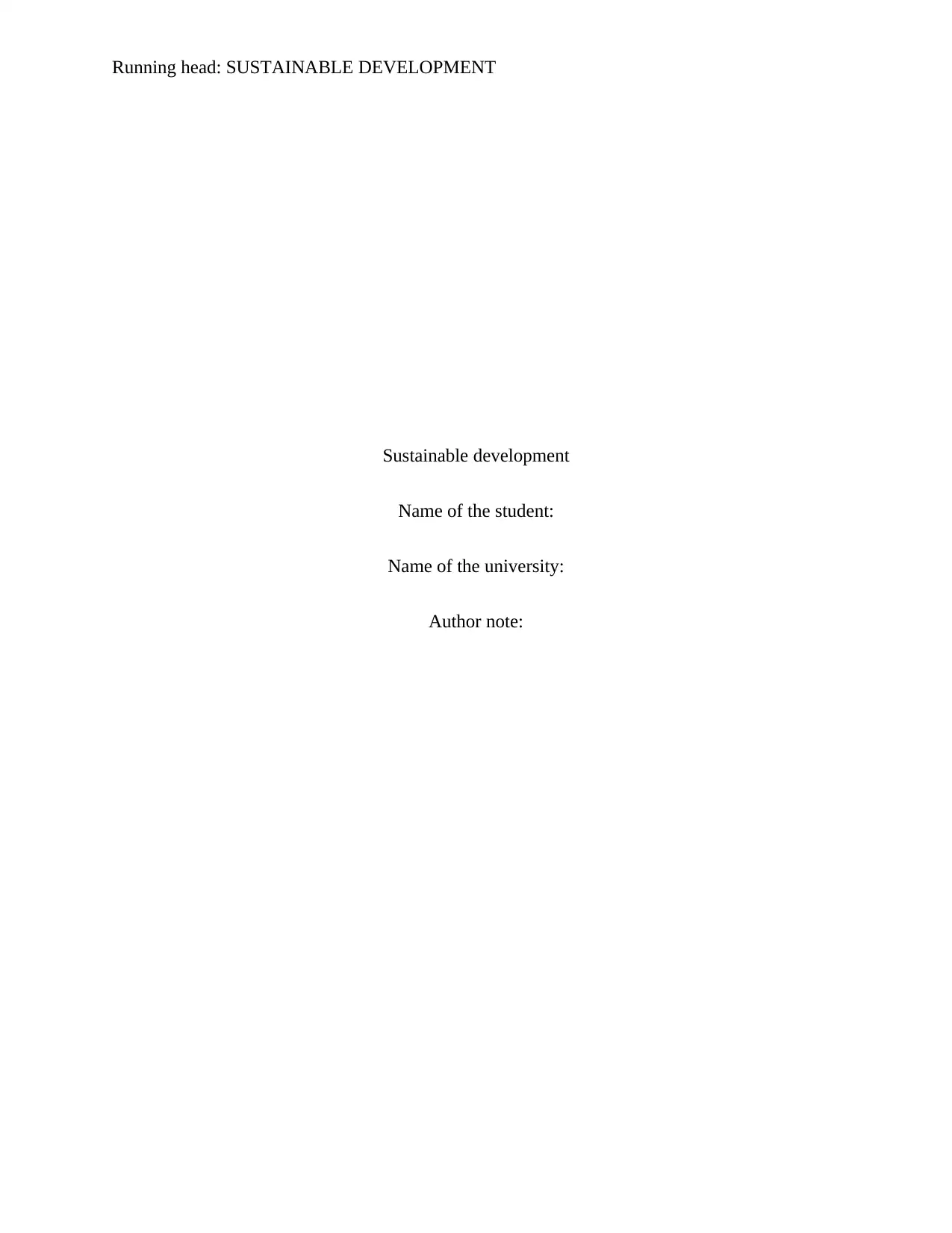
Running head: SUSTAINABLE DEVELOPMENT
Sustainable development
Name of the student:
Name of the university:
Author note:
Sustainable development
Name of the student:
Name of the university:
Author note:
Paraphrase This Document
Need a fresh take? Get an instant paraphrase of this document with our AI Paraphraser
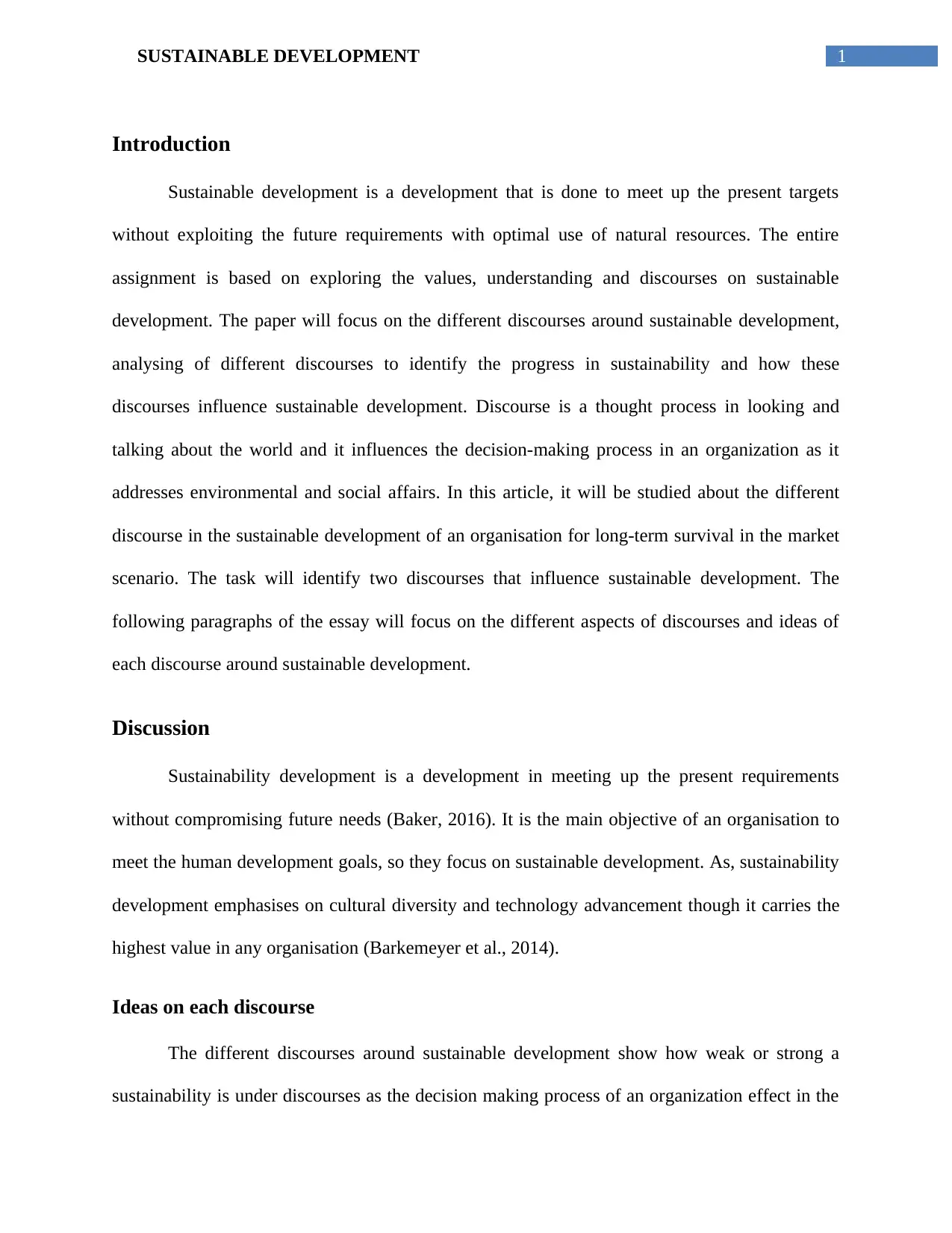
1SUSTAINABLE DEVELOPMENT
Introduction
Sustainable development is a development that is done to meet up the present targets
without exploiting the future requirements with optimal use of natural resources. The entire
assignment is based on exploring the values, understanding and discourses on sustainable
development. The paper will focus on the different discourses around sustainable development,
analysing of different discourses to identify the progress in sustainability and how these
discourses influence sustainable development. Discourse is a thought process in looking and
talking about the world and it influences the decision-making process in an organization as it
addresses environmental and social affairs. In this article, it will be studied about the different
discourse in the sustainable development of an organisation for long-term survival in the market
scenario. The task will identify two discourses that influence sustainable development. The
following paragraphs of the essay will focus on the different aspects of discourses and ideas of
each discourse around sustainable development.
Discussion
Sustainability development is a development in meeting up the present requirements
without compromising future needs (Baker, 2016). It is the main objective of an organisation to
meet the human development goals, so they focus on sustainable development. As, sustainability
development emphasises on cultural diversity and technology advancement though it carries the
highest value in any organisation (Barkemeyer et al., 2014).
Ideas on each discourse
The different discourses around sustainable development show how weak or strong a
sustainability is under discourses as the decision making process of an organization effect in the
Introduction
Sustainable development is a development that is done to meet up the present targets
without exploiting the future requirements with optimal use of natural resources. The entire
assignment is based on exploring the values, understanding and discourses on sustainable
development. The paper will focus on the different discourses around sustainable development,
analysing of different discourses to identify the progress in sustainability and how these
discourses influence sustainable development. Discourse is a thought process in looking and
talking about the world and it influences the decision-making process in an organization as it
addresses environmental and social affairs. In this article, it will be studied about the different
discourse in the sustainable development of an organisation for long-term survival in the market
scenario. The task will identify two discourses that influence sustainable development. The
following paragraphs of the essay will focus on the different aspects of discourses and ideas of
each discourse around sustainable development.
Discussion
Sustainability development is a development in meeting up the present requirements
without compromising future needs (Baker, 2016). It is the main objective of an organisation to
meet the human development goals, so they focus on sustainable development. As, sustainability
development emphasises on cultural diversity and technology advancement though it carries the
highest value in any organisation (Barkemeyer et al., 2014).
Ideas on each discourse
The different discourses around sustainable development show how weak or strong a
sustainability is under discourses as the decision making process of an organization effect in the
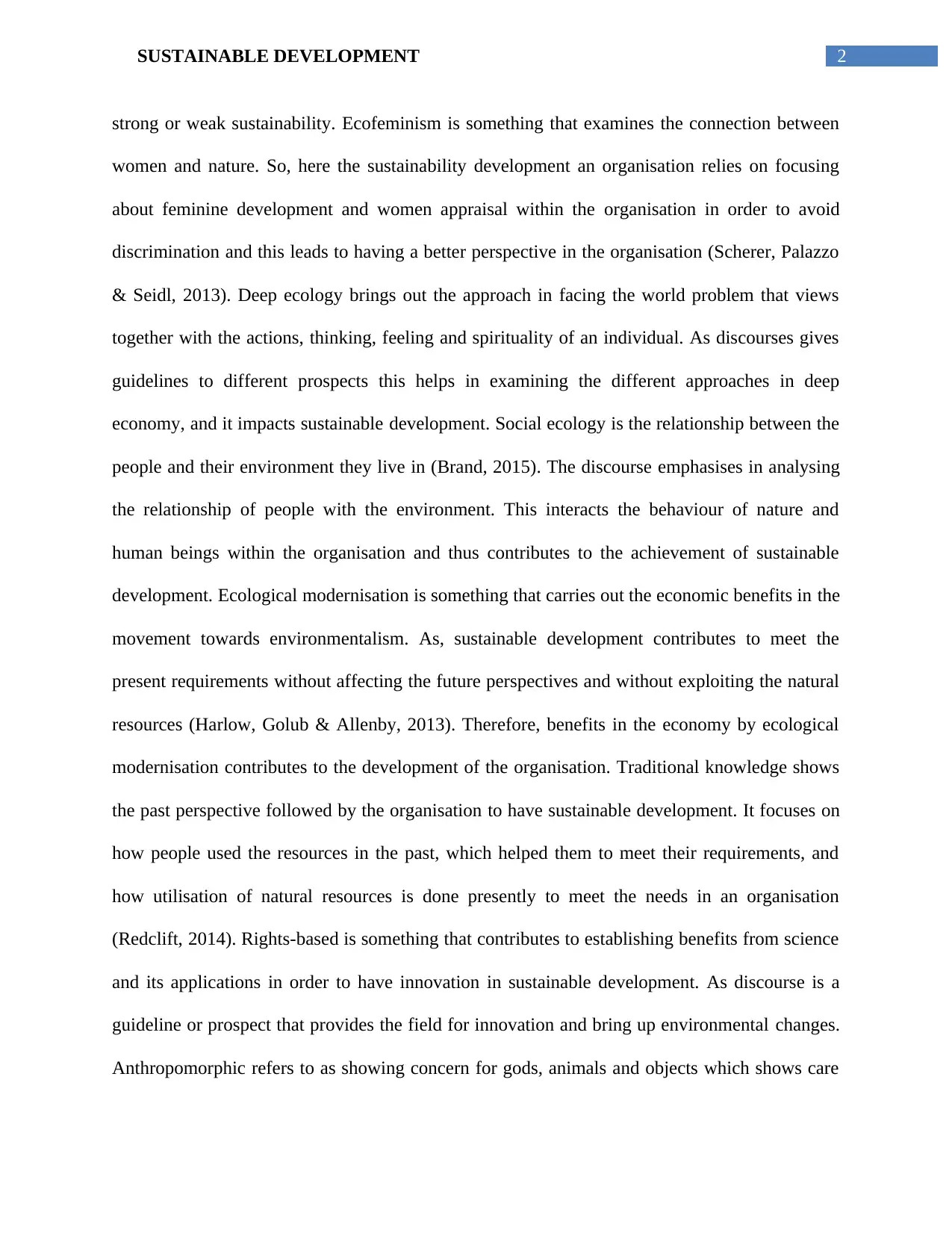
2SUSTAINABLE DEVELOPMENT
strong or weak sustainability. Ecofeminism is something that examines the connection between
women and nature. So, here the sustainability development an organisation relies on focusing
about feminine development and women appraisal within the organisation in order to avoid
discrimination and this leads to having a better perspective in the organisation (Scherer, Palazzo
& Seidl, 2013). Deep ecology brings out the approach in facing the world problem that views
together with the actions, thinking, feeling and spirituality of an individual. As discourses gives
guidelines to different prospects this helps in examining the different approaches in deep
economy, and it impacts sustainable development. Social ecology is the relationship between the
people and their environment they live in (Brand, 2015). The discourse emphasises in analysing
the relationship of people with the environment. This interacts the behaviour of nature and
human beings within the organisation and thus contributes to the achievement of sustainable
development. Ecological modernisation is something that carries out the economic benefits in the
movement towards environmentalism. As, sustainable development contributes to meet the
present requirements without affecting the future perspectives and without exploiting the natural
resources (Harlow, Golub & Allenby, 2013). Therefore, benefits in the economy by ecological
modernisation contributes to the development of the organisation. Traditional knowledge shows
the past perspective followed by the organisation to have sustainable development. It focuses on
how people used the resources in the past, which helped them to meet their requirements, and
how utilisation of natural resources is done presently to meet the needs in an organisation
(Redclift, 2014). Rights-based is something that contributes to establishing benefits from science
and its applications in order to have innovation in sustainable development. As discourse is a
guideline or prospect that provides the field for innovation and bring up environmental changes.
Anthropomorphic refers to as showing concern for gods, animals and objects which shows care
strong or weak sustainability. Ecofeminism is something that examines the connection between
women and nature. So, here the sustainability development an organisation relies on focusing
about feminine development and women appraisal within the organisation in order to avoid
discrimination and this leads to having a better perspective in the organisation (Scherer, Palazzo
& Seidl, 2013). Deep ecology brings out the approach in facing the world problem that views
together with the actions, thinking, feeling and spirituality of an individual. As discourses gives
guidelines to different prospects this helps in examining the different approaches in deep
economy, and it impacts sustainable development. Social ecology is the relationship between the
people and their environment they live in (Brand, 2015). The discourse emphasises in analysing
the relationship of people with the environment. This interacts the behaviour of nature and
human beings within the organisation and thus contributes to the achievement of sustainable
development. Ecological modernisation is something that carries out the economic benefits in the
movement towards environmentalism. As, sustainable development contributes to meet the
present requirements without affecting the future perspectives and without exploiting the natural
resources (Harlow, Golub & Allenby, 2013). Therefore, benefits in the economy by ecological
modernisation contributes to the development of the organisation. Traditional knowledge shows
the past perspective followed by the organisation to have sustainable development. It focuses on
how people used the resources in the past, which helped them to meet their requirements, and
how utilisation of natural resources is done presently to meet the needs in an organisation
(Redclift, 2014). Rights-based is something that contributes to establishing benefits from science
and its applications in order to have innovation in sustainable development. As discourse is a
guideline or prospect that provides the field for innovation and bring up environmental changes.
Anthropomorphic refers to as showing concern for gods, animals and objects which shows care
⊘ This is a preview!⊘
Do you want full access?
Subscribe today to unlock all pages.

Trusted by 1+ million students worldwide
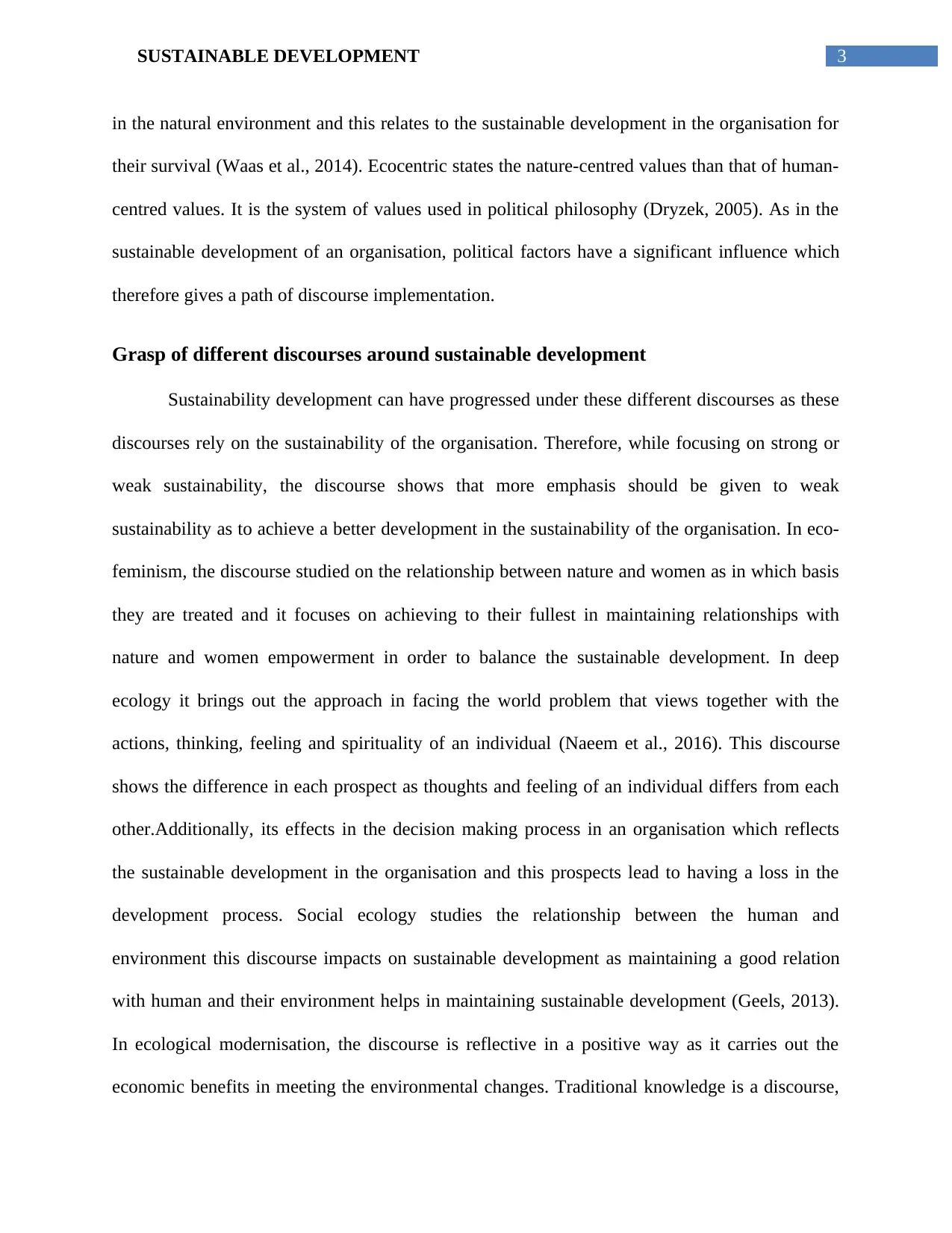
3SUSTAINABLE DEVELOPMENT
in the natural environment and this relates to the sustainable development in the organisation for
their survival (Waas et al., 2014). Ecocentric states the nature-centred values than that of human-
centred values. It is the system of values used in political philosophy (Dryzek, 2005). As in the
sustainable development of an organisation, political factors have a significant influence which
therefore gives a path of discourse implementation.
Grasp of different discourses around sustainable development
Sustainability development can have progressed under these different discourses as these
discourses rely on the sustainability of the organisation. Therefore, while focusing on strong or
weak sustainability, the discourse shows that more emphasis should be given to weak
sustainability as to achieve a better development in the sustainability of the organisation. In eco-
feminism, the discourse studied on the relationship between nature and women as in which basis
they are treated and it focuses on achieving to their fullest in maintaining relationships with
nature and women empowerment in order to balance the sustainable development. In deep
ecology it brings out the approach in facing the world problem that views together with the
actions, thinking, feeling and spirituality of an individual (Naeem et al., 2016). This discourse
shows the difference in each prospect as thoughts and feeling of an individual differs from each
other.Additionally, its effects in the decision making process in an organisation which reflects
the sustainable development in the organisation and this prospects lead to having a loss in the
development process. Social ecology studies the relationship between the human and
environment this discourse impacts on sustainable development as maintaining a good relation
with human and their environment helps in maintaining sustainable development (Geels, 2013).
In ecological modernisation, the discourse is reflective in a positive way as it carries out the
economic benefits in meeting the environmental changes. Traditional knowledge is a discourse,
in the natural environment and this relates to the sustainable development in the organisation for
their survival (Waas et al., 2014). Ecocentric states the nature-centred values than that of human-
centred values. It is the system of values used in political philosophy (Dryzek, 2005). As in the
sustainable development of an organisation, political factors have a significant influence which
therefore gives a path of discourse implementation.
Grasp of different discourses around sustainable development
Sustainability development can have progressed under these different discourses as these
discourses rely on the sustainability of the organisation. Therefore, while focusing on strong or
weak sustainability, the discourse shows that more emphasis should be given to weak
sustainability as to achieve a better development in the sustainability of the organisation. In eco-
feminism, the discourse studied on the relationship between nature and women as in which basis
they are treated and it focuses on achieving to their fullest in maintaining relationships with
nature and women empowerment in order to balance the sustainable development. In deep
ecology it brings out the approach in facing the world problem that views together with the
actions, thinking, feeling and spirituality of an individual (Naeem et al., 2016). This discourse
shows the difference in each prospect as thoughts and feeling of an individual differs from each
other.Additionally, its effects in the decision making process in an organisation which reflects
the sustainable development in the organisation and this prospects lead to having a loss in the
development process. Social ecology studies the relationship between the human and
environment this discourse impacts on sustainable development as maintaining a good relation
with human and their environment helps in maintaining sustainable development (Geels, 2013).
In ecological modernisation, the discourse is reflective in a positive way as it carries out the
economic benefits in meeting the environmental changes. Traditional knowledge is a discourse,
Paraphrase This Document
Need a fresh take? Get an instant paraphrase of this document with our AI Paraphraser
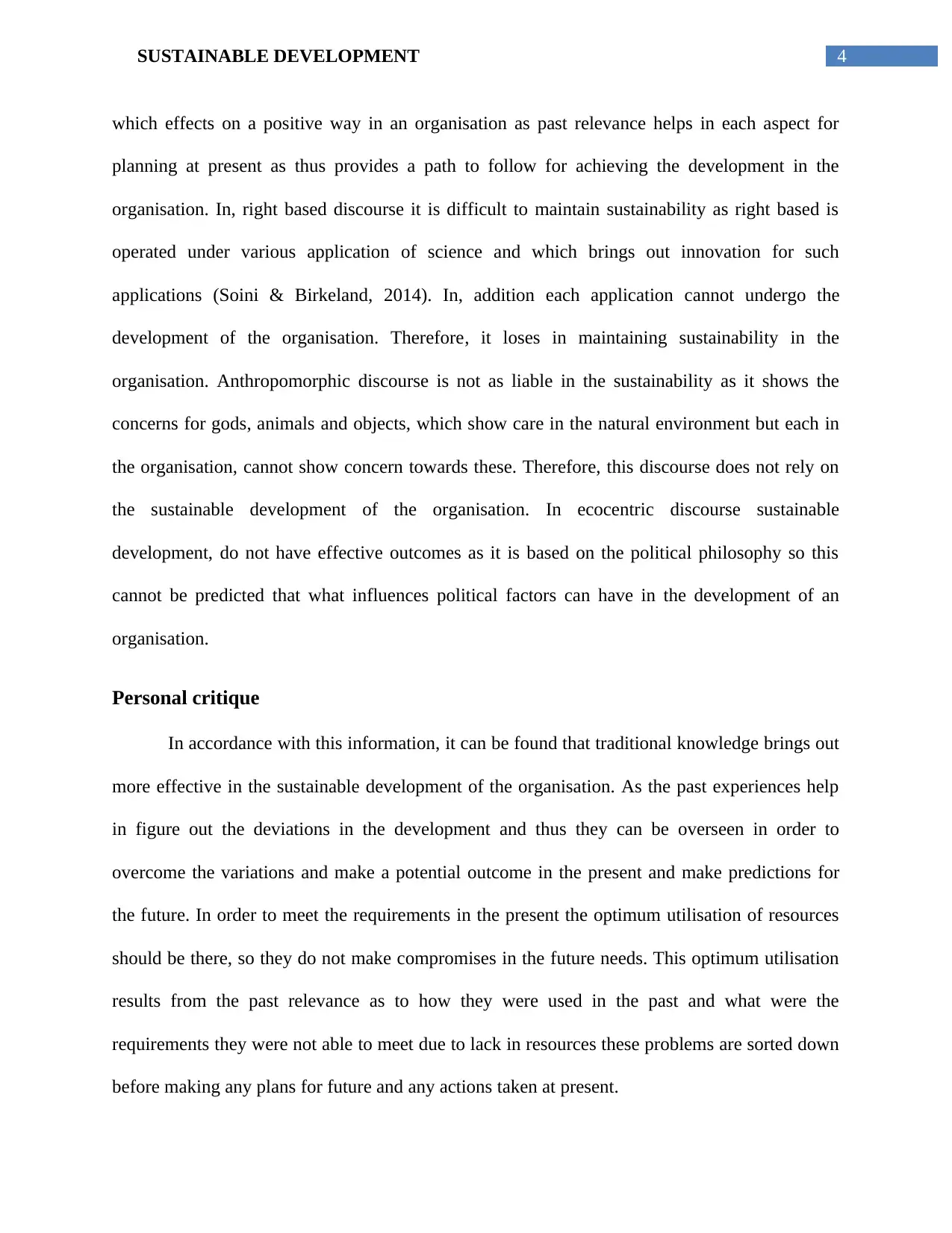
4SUSTAINABLE DEVELOPMENT
which effects on a positive way in an organisation as past relevance helps in each aspect for
planning at present as thus provides a path to follow for achieving the development in the
organisation. In, right based discourse it is difficult to maintain sustainability as right based is
operated under various application of science and which brings out innovation for such
applications (Soini & Birkeland, 2014). In, addition each application cannot undergo the
development of the organisation. Therefore, it loses in maintaining sustainability in the
organisation. Anthropomorphic discourse is not as liable in the sustainability as it shows the
concerns for gods, animals and objects, which show care in the natural environment but each in
the organisation, cannot show concern towards these. Therefore, this discourse does not rely on
the sustainable development of the organisation. In ecocentric discourse sustainable
development, do not have effective outcomes as it is based on the political philosophy so this
cannot be predicted that what influences political factors can have in the development of an
organisation.
Personal critique
In accordance with this information, it can be found that traditional knowledge brings out
more effective in the sustainable development of the organisation. As the past experiences help
in figure out the deviations in the development and thus they can be overseen in order to
overcome the variations and make a potential outcome in the present and make predictions for
the future. In order to meet the requirements in the present the optimum utilisation of resources
should be there, so they do not make compromises in the future needs. This optimum utilisation
results from the past relevance as to how they were used in the past and what were the
requirements they were not able to meet due to lack in resources these problems are sorted down
before making any plans for future and any actions taken at present.
which effects on a positive way in an organisation as past relevance helps in each aspect for
planning at present as thus provides a path to follow for achieving the development in the
organisation. In, right based discourse it is difficult to maintain sustainability as right based is
operated under various application of science and which brings out innovation for such
applications (Soini & Birkeland, 2014). In, addition each application cannot undergo the
development of the organisation. Therefore, it loses in maintaining sustainability in the
organisation. Anthropomorphic discourse is not as liable in the sustainability as it shows the
concerns for gods, animals and objects, which show care in the natural environment but each in
the organisation, cannot show concern towards these. Therefore, this discourse does not rely on
the sustainable development of the organisation. In ecocentric discourse sustainable
development, do not have effective outcomes as it is based on the political philosophy so this
cannot be predicted that what influences political factors can have in the development of an
organisation.
Personal critique
In accordance with this information, it can be found that traditional knowledge brings out
more effective in the sustainable development of the organisation. As the past experiences help
in figure out the deviations in the development and thus they can be overseen in order to
overcome the variations and make a potential outcome in the present and make predictions for
the future. In order to meet the requirements in the present the optimum utilisation of resources
should be there, so they do not make compromises in the future needs. This optimum utilisation
results from the past relevance as to how they were used in the past and what were the
requirements they were not able to meet due to lack in resources these problems are sorted down
before making any plans for future and any actions taken at present.
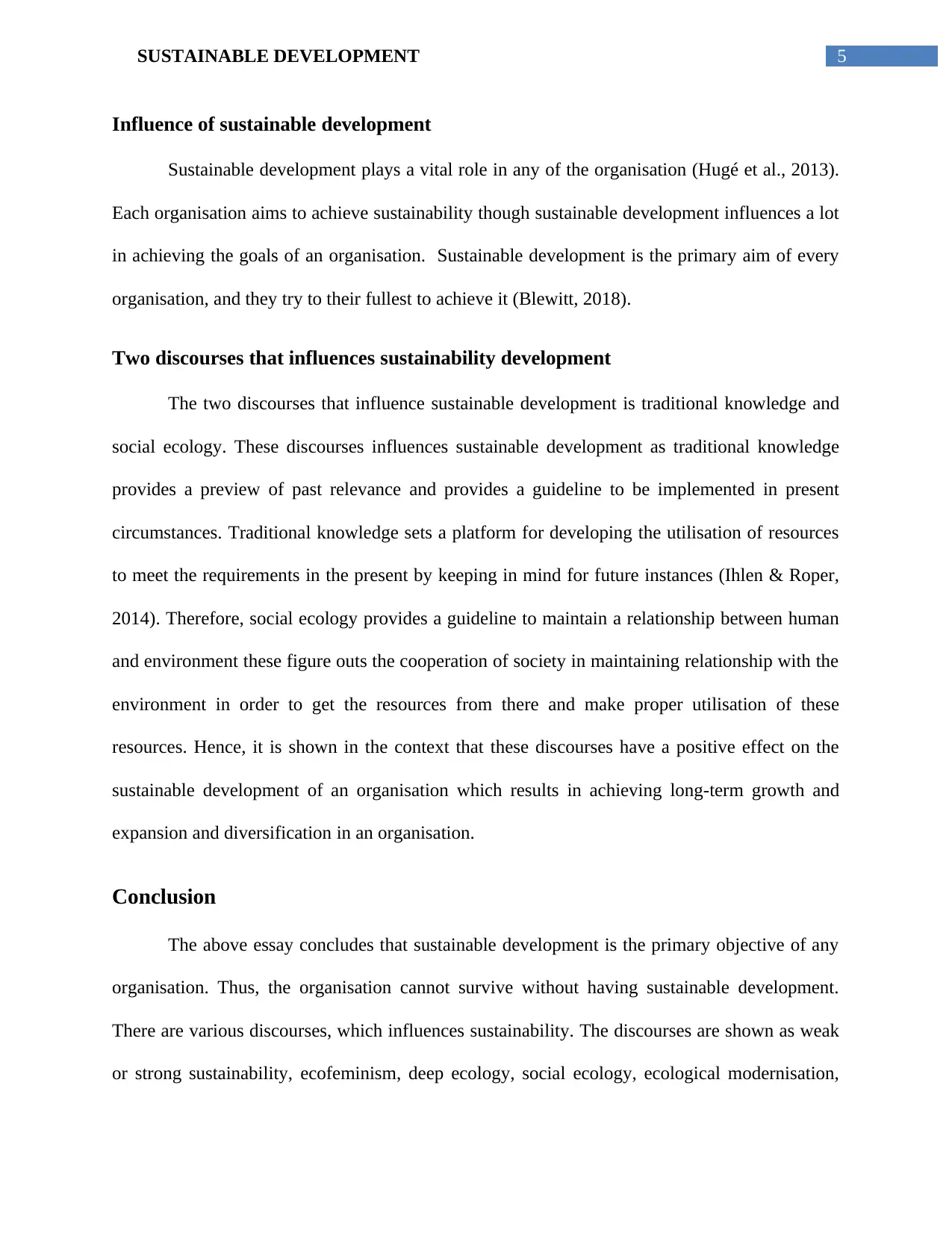
5SUSTAINABLE DEVELOPMENT
Influence of sustainable development
Sustainable development plays a vital role in any of the organisation (Hugé et al., 2013).
Each organisation aims to achieve sustainability though sustainable development influences a lot
in achieving the goals of an organisation. Sustainable development is the primary aim of every
organisation, and they try to their fullest to achieve it (Blewitt, 2018).
Two discourses that influences sustainability development
The two discourses that influence sustainable development is traditional knowledge and
social ecology. These discourses influences sustainable development as traditional knowledge
provides a preview of past relevance and provides a guideline to be implemented in present
circumstances. Traditional knowledge sets a platform for developing the utilisation of resources
to meet the requirements in the present by keeping in mind for future instances (Ihlen & Roper,
2014). Therefore, social ecology provides a guideline to maintain a relationship between human
and environment these figure outs the cooperation of society in maintaining relationship with the
environment in order to get the resources from there and make proper utilisation of these
resources. Hence, it is shown in the context that these discourses have a positive effect on the
sustainable development of an organisation which results in achieving long-term growth and
expansion and diversification in an organisation.
Conclusion
The above essay concludes that sustainable development is the primary objective of any
organisation. Thus, the organisation cannot survive without having sustainable development.
There are various discourses, which influences sustainability. The discourses are shown as weak
or strong sustainability, ecofeminism, deep ecology, social ecology, ecological modernisation,
Influence of sustainable development
Sustainable development plays a vital role in any of the organisation (Hugé et al., 2013).
Each organisation aims to achieve sustainability though sustainable development influences a lot
in achieving the goals of an organisation. Sustainable development is the primary aim of every
organisation, and they try to their fullest to achieve it (Blewitt, 2018).
Two discourses that influences sustainability development
The two discourses that influence sustainable development is traditional knowledge and
social ecology. These discourses influences sustainable development as traditional knowledge
provides a preview of past relevance and provides a guideline to be implemented in present
circumstances. Traditional knowledge sets a platform for developing the utilisation of resources
to meet the requirements in the present by keeping in mind for future instances (Ihlen & Roper,
2014). Therefore, social ecology provides a guideline to maintain a relationship between human
and environment these figure outs the cooperation of society in maintaining relationship with the
environment in order to get the resources from there and make proper utilisation of these
resources. Hence, it is shown in the context that these discourses have a positive effect on the
sustainable development of an organisation which results in achieving long-term growth and
expansion and diversification in an organisation.
Conclusion
The above essay concludes that sustainable development is the primary objective of any
organisation. Thus, the organisation cannot survive without having sustainable development.
There are various discourses, which influences sustainability. The discourses are shown as weak
or strong sustainability, ecofeminism, deep ecology, social ecology, ecological modernisation,
⊘ This is a preview!⊘
Do you want full access?
Subscribe today to unlock all pages.

Trusted by 1+ million students worldwide
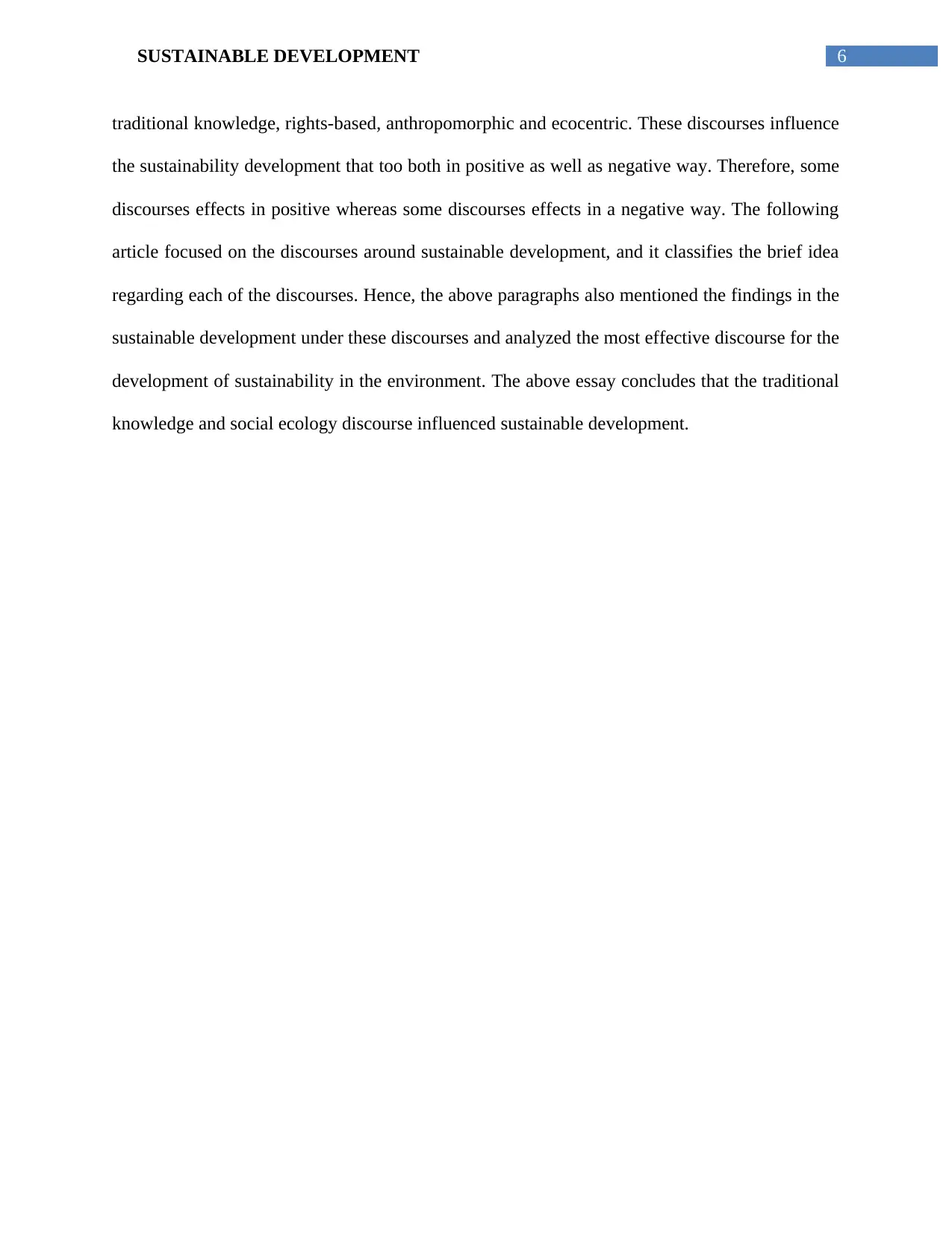
6SUSTAINABLE DEVELOPMENT
traditional knowledge, rights-based, anthropomorphic and ecocentric. These discourses influence
the sustainability development that too both in positive as well as negative way. Therefore, some
discourses effects in positive whereas some discourses effects in a negative way. The following
article focused on the discourses around sustainable development, and it classifies the brief idea
regarding each of the discourses. Hence, the above paragraphs also mentioned the findings in the
sustainable development under these discourses and analyzed the most effective discourse for the
development of sustainability in the environment. The above essay concludes that the traditional
knowledge and social ecology discourse influenced sustainable development.
traditional knowledge, rights-based, anthropomorphic and ecocentric. These discourses influence
the sustainability development that too both in positive as well as negative way. Therefore, some
discourses effects in positive whereas some discourses effects in a negative way. The following
article focused on the discourses around sustainable development, and it classifies the brief idea
regarding each of the discourses. Hence, the above paragraphs also mentioned the findings in the
sustainable development under these discourses and analyzed the most effective discourse for the
development of sustainability in the environment. The above essay concludes that the traditional
knowledge and social ecology discourse influenced sustainable development.
Paraphrase This Document
Need a fresh take? Get an instant paraphrase of this document with our AI Paraphraser
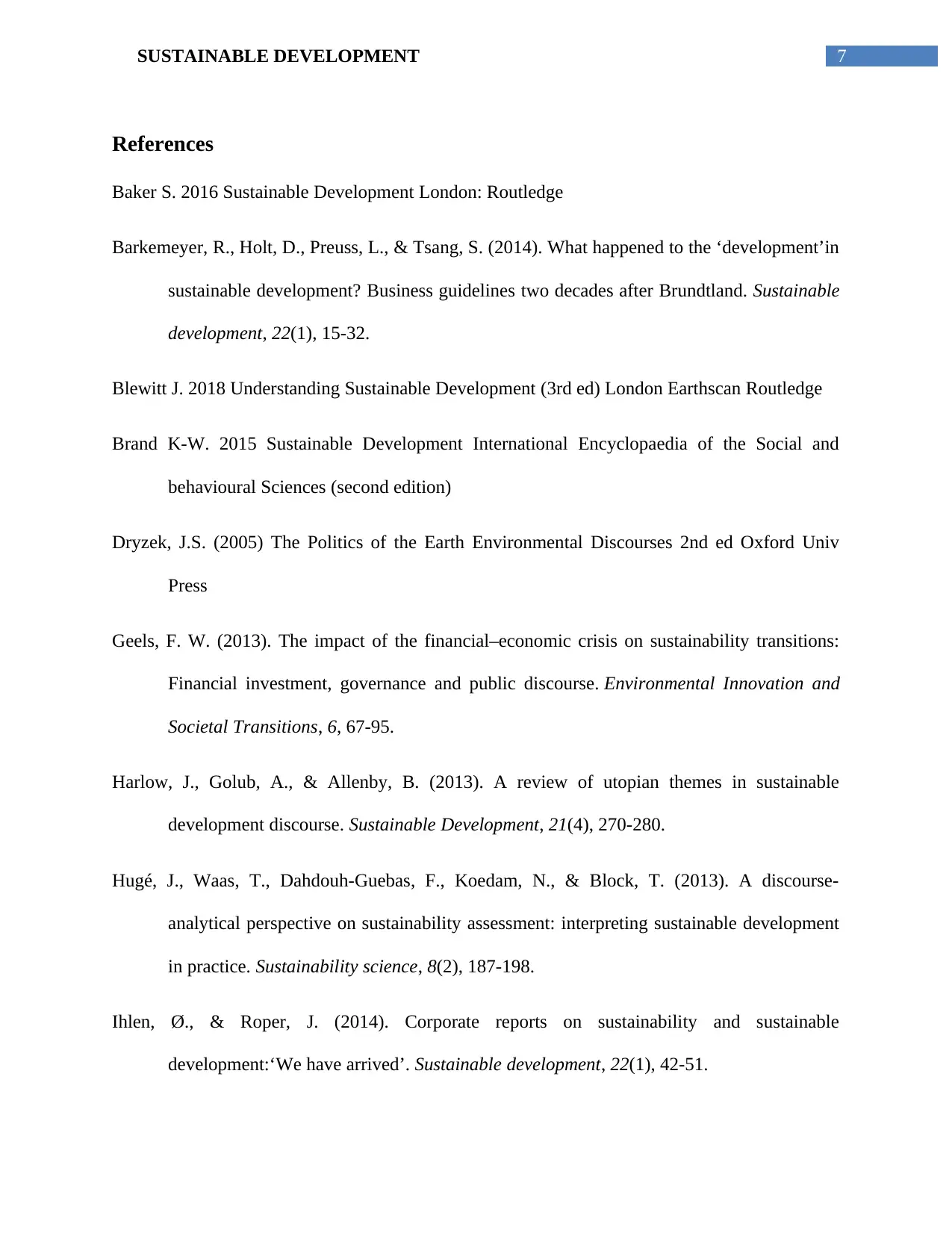
7SUSTAINABLE DEVELOPMENT
References
Baker S. 2016 Sustainable Development London: Routledge
Barkemeyer, R., Holt, D., Preuss, L., & Tsang, S. (2014). What happened to the ‘development’in
sustainable development? Business guidelines two decades after Brundtland. Sustainable
development, 22(1), 15-32.
Blewitt J. 2018 Understanding Sustainable Development (3rd ed) London Earthscan Routledge
Brand K-W. 2015 Sustainable Development International Encyclopaedia of the Social and
behavioural Sciences (second edition)
Dryzek, J.S. (2005) The Politics of the Earth Environmental Discourses 2nd ed Oxford Univ
Press
Geels, F. W. (2013). The impact of the financial–economic crisis on sustainability transitions:
Financial investment, governance and public discourse. Environmental Innovation and
Societal Transitions, 6, 67-95.
Harlow, J., Golub, A., & Allenby, B. (2013). A review of utopian themes in sustainable
development discourse. Sustainable Development, 21(4), 270-280.
Hugé, J., Waas, T., Dahdouh-Guebas, F., Koedam, N., & Block, T. (2013). A discourse-
analytical perspective on sustainability assessment: interpreting sustainable development
in practice. Sustainability science, 8(2), 187-198.
Ihlen, Ø., & Roper, J. (2014). Corporate reports on sustainability and sustainable
development:‘We have arrived’. Sustainable development, 22(1), 42-51.
References
Baker S. 2016 Sustainable Development London: Routledge
Barkemeyer, R., Holt, D., Preuss, L., & Tsang, S. (2014). What happened to the ‘development’in
sustainable development? Business guidelines two decades after Brundtland. Sustainable
development, 22(1), 15-32.
Blewitt J. 2018 Understanding Sustainable Development (3rd ed) London Earthscan Routledge
Brand K-W. 2015 Sustainable Development International Encyclopaedia of the Social and
behavioural Sciences (second edition)
Dryzek, J.S. (2005) The Politics of the Earth Environmental Discourses 2nd ed Oxford Univ
Press
Geels, F. W. (2013). The impact of the financial–economic crisis on sustainability transitions:
Financial investment, governance and public discourse. Environmental Innovation and
Societal Transitions, 6, 67-95.
Harlow, J., Golub, A., & Allenby, B. (2013). A review of utopian themes in sustainable
development discourse. Sustainable Development, 21(4), 270-280.
Hugé, J., Waas, T., Dahdouh-Guebas, F., Koedam, N., & Block, T. (2013). A discourse-
analytical perspective on sustainability assessment: interpreting sustainable development
in practice. Sustainability science, 8(2), 187-198.
Ihlen, Ø., & Roper, J. (2014). Corporate reports on sustainability and sustainable
development:‘We have arrived’. Sustainable development, 22(1), 42-51.
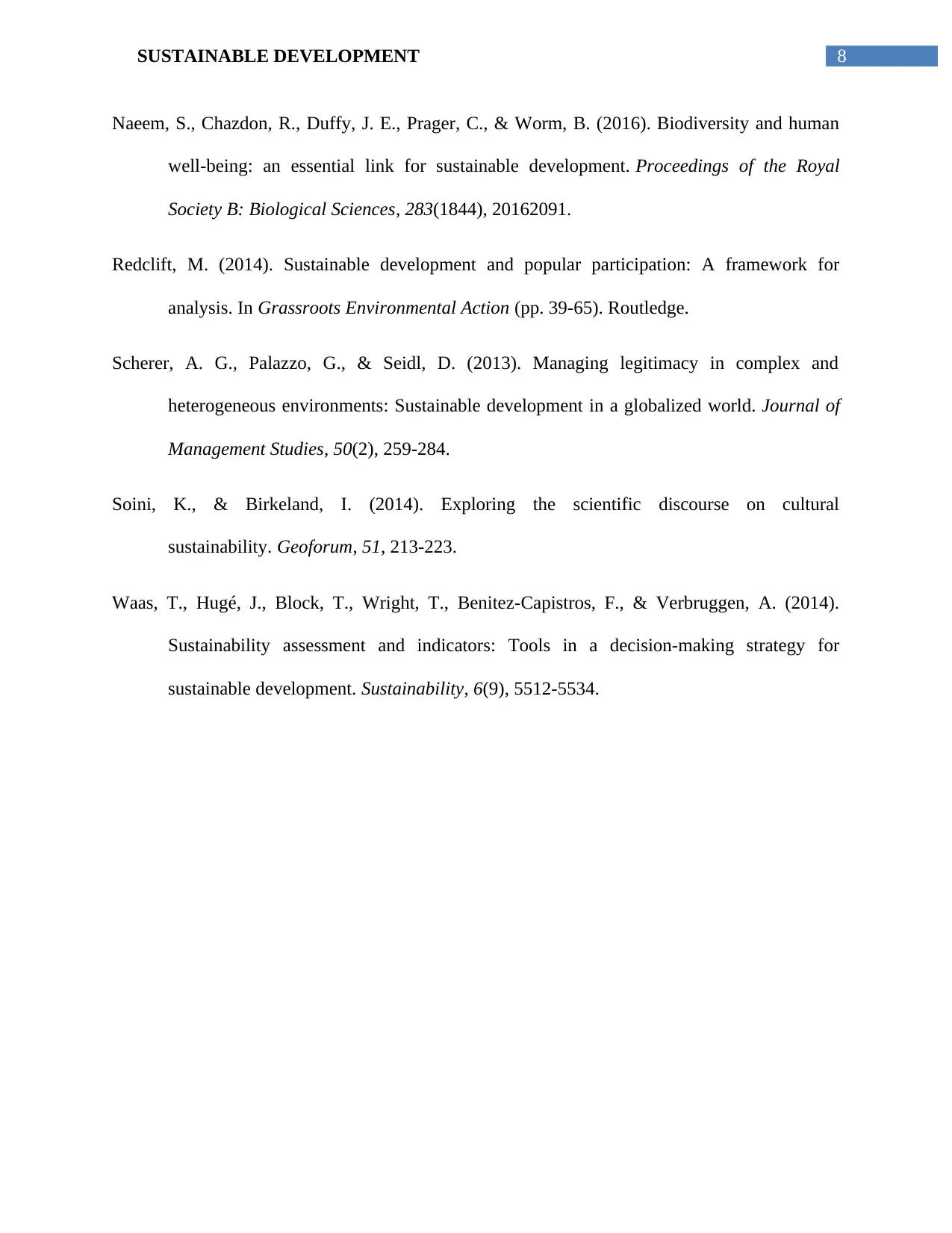
8SUSTAINABLE DEVELOPMENT
Naeem, S., Chazdon, R., Duffy, J. E., Prager, C., & Worm, B. (2016). Biodiversity and human
well-being: an essential link for sustainable development. Proceedings of the Royal
Society B: Biological Sciences, 283(1844), 20162091.
Redclift, M. (2014). Sustainable development and popular participation: A framework for
analysis. In Grassroots Environmental Action (pp. 39-65). Routledge.
Scherer, A. G., Palazzo, G., & Seidl, D. (2013). Managing legitimacy in complex and
heterogeneous environments: Sustainable development in a globalized world. Journal of
Management Studies, 50(2), 259-284.
Soini, K., & Birkeland, I. (2014). Exploring the scientific discourse on cultural
sustainability. Geoforum, 51, 213-223.
Waas, T., Hugé, J., Block, T., Wright, T., Benitez-Capistros, F., & Verbruggen, A. (2014).
Sustainability assessment and indicators: Tools in a decision-making strategy for
sustainable development. Sustainability, 6(9), 5512-5534.
Naeem, S., Chazdon, R., Duffy, J. E., Prager, C., & Worm, B. (2016). Biodiversity and human
well-being: an essential link for sustainable development. Proceedings of the Royal
Society B: Biological Sciences, 283(1844), 20162091.
Redclift, M. (2014). Sustainable development and popular participation: A framework for
analysis. In Grassroots Environmental Action (pp. 39-65). Routledge.
Scherer, A. G., Palazzo, G., & Seidl, D. (2013). Managing legitimacy in complex and
heterogeneous environments: Sustainable development in a globalized world. Journal of
Management Studies, 50(2), 259-284.
Soini, K., & Birkeland, I. (2014). Exploring the scientific discourse on cultural
sustainability. Geoforum, 51, 213-223.
Waas, T., Hugé, J., Block, T., Wright, T., Benitez-Capistros, F., & Verbruggen, A. (2014).
Sustainability assessment and indicators: Tools in a decision-making strategy for
sustainable development. Sustainability, 6(9), 5512-5534.
⊘ This is a preview!⊘
Do you want full access?
Subscribe today to unlock all pages.

Trusted by 1+ million students worldwide
1 out of 9
Related Documents
Your All-in-One AI-Powered Toolkit for Academic Success.
+13062052269
info@desklib.com
Available 24*7 on WhatsApp / Email
![[object Object]](/_next/static/media/star-bottom.7253800d.svg)
Unlock your academic potential
Copyright © 2020–2025 A2Z Services. All Rights Reserved. Developed and managed by ZUCOL.




